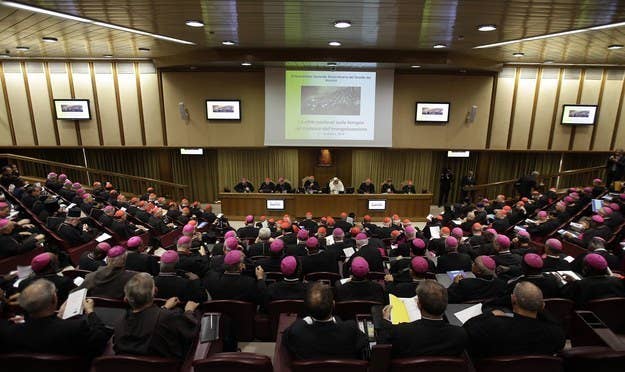
A groundbreaking document, compiled after the first week of discussions at an assembly of more than 200 Catholic Church leaders from around the world, calls for "serious reflection" on "the question of homosexuality" and urges Catholic communities to find a space for lesbian, gay, and bisexual people within the catechism.
"Homosexuals have gifts and qualities to offer to the Christian community," the document states. "Are we capable of welcoming these people, guaranteeing to them a fraternal space in our communities? Often they wish to encounter a Church that offers them a welcoming home. Are our communities capable of providing that, accepting and valuing their sexual orientation, without compromising Catholic doctrine on the family and matrimony?"
While the text does not signal any change in the Catholic Church's opposition to "homosexual acts" or same-sex marriage, its tone is far more restrained and compassionate than in earlier official Vatican documents on the subject. It bears a similarity to the language of the United States Conference of Catholic Bishops's "Always Our Children" pastoral message, a document to parents of gay children that generated controversy when it was issued in 1997.
The document from the assembly, known as the Extraordinary Synod of Bishops on the Family, is significant, because, for the first time, the leaders of the Catholic Church appear to be responding to the more moderate tone Pope Francis has set in the past about the role of same-sex couples, the children of same-sex couples' marriages, and civil unions.
Although the pope stated that marriage is "between a man and a woman" in a March interview with Italian newspaper Corriere della Sera, he acknowledged that some types of civil unions might be acceptable to the Catholic Church. "The secular states want to justify civil unions to regulate different situations of living together, driven by the need to regulate economic aspects between people, such as ensuring health care," he said. "These are coexistence agreements of various kinds, of which I wouldn't know how to identify their different forms. We have to look at the different cases and evaluate them in their variety."
In January, the pope urged the Church to "consider how to proclaim Jesus Christ to a generation that is changing," particularly emphasizing the need to welcome children and young adults who were raised by same-sex or divorced parents. "We must be careful not to administer a vaccine against faith to them," he said.
The Synod on Family ends on Oct. 25.
The full section on "Welcoming Homosexual Persons" from the report:
Homosexuals have gifts and qualities to offer to the Christian community: are we capable of welcoming these people, guaranteeing to them a fraternal space in our communities? Often they wish to encounter a Church that offers them a welcoming home. Are our communities capable of providing that, accepting and valuing their sexual orientation, without compromising Catholic doctrine on the family and matrimony?
The question of homosexuality leads to a serious reflection on how to elaborate realistic paths of affective growth and human and evangelical maturity integrating the sexual dimension: it appears therefore as an important educative challenge. The Church furthermore affirms that unions between people of the same sex cannot be considered on the same footing as matrimony between man and woman. Nor is it acceptable that pressure be brought to bear on pastors or that international bodies make financial aid dependent on the introduction of regulations inspired by gender ideology.
Without denying the moral problems connected to homosexual unions it has to be noted that there are cases in which mutual aid to the point of sacrifice constitutes a precious support in the life of the partners. Furthermore, the Church pays special attention to the children who live with couples of the same sex, emphasizing that the needs and rights of the little ones must always be given priority.
